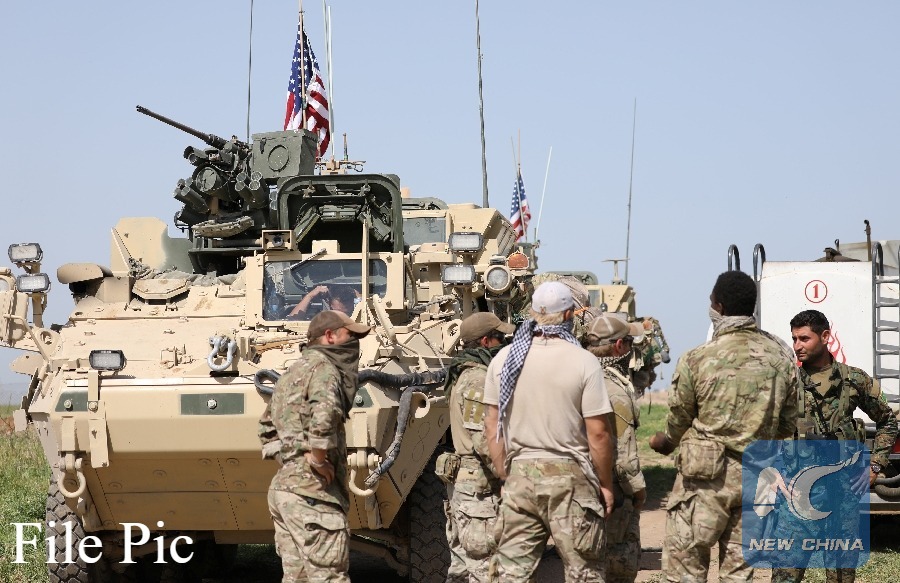
Kurdish fighters from the People's Protection Units (YPG) chat with members of U.S. forces in the town of Darbasiya next to the Turkish border, Syria, on April 29, 2017. (Reuters file photo)
ANKARA, Dec. 20 (Xinhua) -- U.S. President Donald Trump's unexpected move to withdraw U.S. troops from war-torn Syria would largely appease NATO ally Turkey, who is ready to launch an offensive against U.S.-backed Kurdish fighters there, said local experts.
The U.S. move came as tensions increase sharply between Washington and Ankara as the latter vowed to wage a military operation against the Kurdish People's Protection Units (YPG) fighters, who will be the first to suffer from the loss of U.S. backing.
Trump, who declared victory on the militant group Islamic State (IS) in Syria, held a phone call with Turkish counterpart Recep Tayyip Erdogan on Dec. 14 to try to head off a Turkish attack which could have put U.S. troops in the crossfire.
"There are many implications, but regarding the U.S.-Turkey ties, it will dissipate the most destructive factor in the partnership between the NATO allies," which is the presence of Kurdish fighters in northeastern Syria that Ankara sees as an threat, Sinan Ulgen, a former diplomat who chairs the Istanbul-based Center for Economics and Foreign Policy Studies (EDAM), told Xinhua.
Ulgen argued that the U.S. move, which is expected but still surprising because of its timing, would have multiple effects on the Syrian crisis. But for Turkey, the exit will cause the YPG to weaken politically and militarily without the U.S. support on the ground.
Erdogan promised last week to crush the Kurdish positions east of the Euphrates river, increasing the risk of a much-dreaded confrontation between soldiers of two major NATO allies.
Such a clash would create a geopolitical crisis at the heart of the world's most powerful military alliance.
The U.S. has a fairly small contingent of about 2,000 troops in Syria, many of them are special operations forces working closely with an alliance of Kurdish and Arab militias known as the Syrian Democratic Forces (SDF).
The partnership with the SDF over the past several years helped defeat IS in Syria but outraged Turkey, which views YPG as an extension of the militant group, the Kurdistan Workers' Party (PKK), which has been fighting for autonomy in Turkey's souteast.
The U.S. decision will undoubtedly free the embattled U.S.-Turkey relationship from a major burden, the U.S. support for the YPG, Serkan Demirtas, a Turkish political analyst and journalist, told Xinhua.
"It's a move that relieves this partnership, a big problem seems now out of the way," commented Demirtas, the Ankara bureau chief of Hurriyet Daily News.
Both Demirtas and Ulgen also pointed out that Turkey could possibly delay or modify its plan for an incursion into northeast Syria to wipe out the YPG militia there in light of Trump's decision which caught his own administration off guard.
On Thursday, Turkish Defense Minister Hulusi Akar said that his country was preparing "intensively for a counter-terrorism military operation" in Syria and warned that Kurdish fighters will be "buried in the trenches they dug," state-run Anadolu Agency reported.
While experts believe that the U.S. withdrawal from Syria would potentially cede control to Turkey, resolving tensions between the two NATO allies.
But, they expressed that concern that the U.S. pullout would create a vacuum in northeastern Syria, where IS has the potential to re-group and re-emerge.
"There are many groups that would want to penetrate the field that the U.S. leave behind, such as IS-linked groups and other radical factions," Demirtas said, warning of a "new chaotic situation" in Syria which shares a 900 km border with Turkey.
This expert also pointed out in the direction of a possible larger U.S.-Turkey understanding on Syria, relaying some unconfirmed reports that the Turkish leader has assured his American counterpart that Turkey could play a bigger role in neutralizing IS in Syria, taking this troublesome load of U.S. soldiers' shoulders.
Ankara and Washington have tried in recent months to seek reconciliation after years of bitter squabbling on different issues. The differences over Syria was at the heart of their disagreement.
"The U.S. decision of an exit seems based on its desperation to avert a Turkish offensive and the risk to loose Turkey altogether," commented international relations professor Hasan Unal from the Maltepe University.
He also underlined that this "very favorable move" would aim to bring the U.S. and Turkey closer to each other, and keep Ankara's distance from Russia, a major military player in Syria.
Just hours after Trump's Syria announcement, the U.S. approved a 3.5-billion-U.S. dollar sale of Patriot missile systems to Turkey. Washington hopes that this sale would replace the S-400 missile system that Turkey has vowed to acquire from Russia, despite the NATO opposition.

